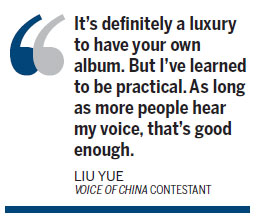A talent for scouting
Updated: 2012-08-08 09:32
By Han Bingbin (China Daily)
|
|||||||||||
 |
|
Liu Yue performs in the popular TV talent show, Voice of China, on Zhejiang Satellite TV. Provided to China Daily |
 |
|
The show's four celebrity judges (from left): Taiwan pop singer Harlem Yu, mainland singer Liu Huan, pop diva Na Ying and singer Yang Kun. Provided to China Daily |

With so many talent shows on television, how does Voice of China differentiate itself? Han Bingbin finds out.
Having failed in several widely-watched national TV talent shows, Liu Yue thought she would be able to stay cool no matter the outcome of her next contest.
The rock fan participated in Voice of China, an authorized reproduction of the Netherlands-originated TV singing contest. And when all four celebrity judges gave her the thumbs up while she was performing, cool is the last word to describe the 30-year-old chubby rocker. Liu cried and had to end her powerful performance prematurely.
| |||
The show, now into its fourth episode, has become Zhejiang Satellite TV's most watched entertainment program so far. With a rating of 3.3 percent (the latest episode) and some 30 million clicks on China's leading video website Youku, it has dwarfed all the other - at least five - talent shows currently available on China's satellite TV channels.
The last time Liu attained such attention was in 2006 during Hunan Satellite TV's Super Girls. But back then, her chubbiness and rock style met with mostly negative responses online. The harshest of them, she still remembers, was from a netizen who asked her to shut up by posting the picture of a pig frothing at the mouth. With too few audience votes, she was soon eliminated from the competition.
She persevered because of her passion for singing. In 2011, she participated in a Taiwan talent show where she made it to the top 10. But critical netizens gave her the nickname "twice-cooked pork", referring to her chubbiness and her repeated failures. Those hard-hitting comments made Liu, a graduate from Nanjing University, decide to end her "rebellious life as a singer".
But when a director of Voice of China called this year, she couldn't resist accepting the invitation to participate because she is a die-hard fan of the American and British versions of the show.
She now feels lucky to be part of it because of its unprecedented quality: a cast of four celebrity judges, including mainland pop diva Na Ying and Taiwan pop king Harlem Yu; as well as a top-notch sound system, supported by Beijing Olympics Opening Ceremony sound director Jin Shaogang to ensure a higher quality display of their voices.
More importantly, she says, the so-called blind choice, where judges sit with their backs to the performers, ensures that the contestants are judged based on their voices alone.
Winners will have a chance to hold their own concerts or be invited as guest performers at the judges' concerts. But the contestants have to fight a tough battle to reach the top. Unlike other talent shows that open doors to the grassroots, Voice of China contestants are hand-picked or in Liu's words, "semi-professionals".
As many as 40 directors travel to all the provincial capitals where local market insiders are ready to offer their lists of recommended talents. They also visit music schools and pubs to scout for qualified singers. Their voices are recorded and these potential contestants are then put through auditions and finally, short-listed to appear on television.
The arduous selection process results in a high level of professionalism on the show, says Lu Wei, publicity director of Voice of China.
Voice alone, however, doesn't qualify. For a score of five, Lu says, two goes to a singer's personal story. He adds that to maintain high ratings, singers with sensational backgrounds are given priority and encouraged to share their stories onstage.
A total of 26 cameras, a high number for a live TV program, are on standby to capture the singers' facial and emotional expressions as well as those of their families and the judges, as they share their life stories.
Millions are probably attracted to the show by heart-wrenching profiles such as a blind street artist who touches them with her rendition of Teresa Teng's songs or, a cute little girl who sings in remembrance of her deceased father.
China's most popular micro-blogger Yao Chen's compliments of the show on micro blogs were echoed by thousands. She says it demonstrates the most valuable elements in life: enthusiasm, optimism, sincerity and bravery.
But the show was also besieged by negative publicity, with netizens posting evidence to suggest that some stories are false. One such posting claims that a poor countryside singer actually came from a rich family. The program responds immediately to such allegations with a public announcement that it has signed integrity pacts with contestants - those who lie will be fired.
In the midst of the dispute, the program is one of the few to win approval from the State Administration of Radio, Film and Television. In 2011, it launched a policy restricting the number of entertainment programs, including talent shows, to prevent TV screens from being vulgarized.
Speaking at a forum hosted by Zhejiang Satellite TV, Gao Changli, an official from the administration, endorsed the show as a role model for incorporating the stories of common people.
But stories are only a tool to attract viewers. Culture critic Tan Fei says ultimately, talent shows' main aim should be to help the aspirants develop a singing career.
In recent years, there have been a growing number of talent competitions in China, after Super Girls produced a few star singers. But none of the other shows has attained equal success. When the bustle is over, many young dreamers are again left in the cold.
"But after all, TV stations are not part of the music industry. They are incapable of taking follow-up action such as packaging and promotion," Tan says.
But Lu Wei says this year, they plan to follow in the footsteps of their foreign counterparts where contestants' live songs are recorded into albums and sold via app stores. Lu says they will produce their young hopefuls' live performances into paid ringtone music via China Mobile.
Some songs are expected to be downloaded millions of times. Those proven to be popular on the mobile platform, Lu says, will receive help to produce their own original music albums. "Hopefully, some super stars will emerge from our show," he says.
That same ideal used to comfort Liu Yue every time her confidence was shattered by failure. But her passion is running thin. Moreover, as a concert planner for years, she has seen people coming in and out of the revolving door of the music industry.
Liu knows that the road to success is steep - these days, album sales are so difficult that singers celebrate when they are able to sell 50,000 copies.
"It's definitely a luxury to have your own album," she says. "But I've learned to be practical. As long as more people hear my voice, that's good enough."
Contact the writer at hanbingbin@chinadaily.com.cn.
Related Stories
China's noodle city hosts festival 2012-08-07 16:04
13 types of operas performed for audience in China's Urumqi 2012-08-06 11:09
China's largest military art show of all time 2012-08-03 09:21
Fabulous foreign talent 2012-07-31 09:35
Chinese youth showcase talents in Toronto 2012-07-26 11:10
Today's Top News
Rescuers race against time for quake victims
Telecom workers restore links
Coal mine blast kills 18 in Jilin
Intl scholarship puts China on the map
More bird flu patients discharged
Gold loses sheen, but still a safe bet
US 'turns blind eye to human rights'
Telecom workers restore links
Hot Topics
Lunar probe , China growth forecasts, Emission rules get tougher, China seen through 'colored lens', International board,
Editor's Picks

|

|

|

|

|

|








